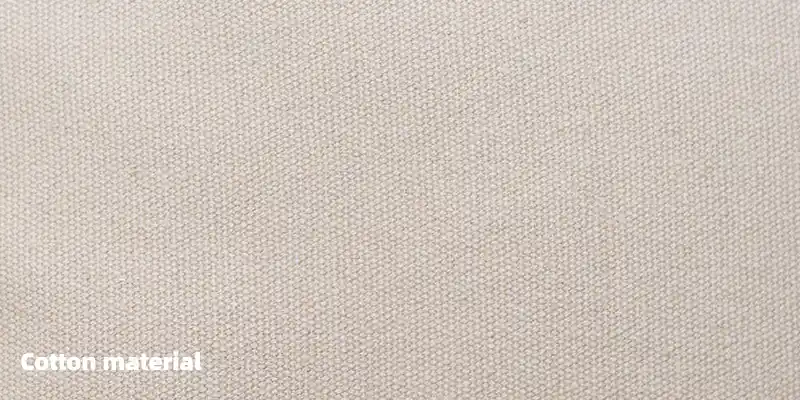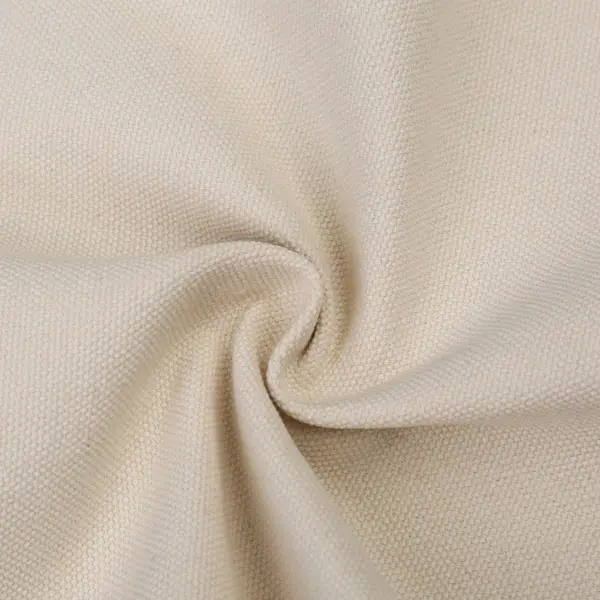
Our Academy
Jacky Zhou
May 1st, 2025

As environmental awareness continues to grow, reusable and biodegradable fabric bags are becoming increasingly favored by both businesses and consumers. In particular, eco-friendly bags made from cotton are widely used in product packaging and brand promotion across various industries.
Muslin, Cotton, and Canvas Bags Compared: Which One Is Best for Your Needs? Muslin bags are lightweight, breathable, and offer clean print results for light packaging. Cotton bags provide moderate thickness and high customizability, ideal for everyday use. Canvas bags are the most durable for heavy items but less suitable for detailed printing. Muslin and cotton are biodegradable, while poly-canvas is less eco-friendly.
While the basic differences among the three types of bags have been briefly compared, choosing the one that best fits your product or brand requires a deeper understanding of how each performs across key features. Keep reading as we break down the strengths and limitations of muslin, cotton, and canvas bags—from material structure to environmental impact—to help you make a more informed decision.

A muslin bag is made from muslin fabric—a lightweight, loosely woven cotton material known for its softness, breathability, and natural texture. Compared to standard cotton bags, muslin bags are thinner and more breathable, making them especially suitable for packaging produce, herbs, dry goods, or lightweight gifts. Muslin has a long history, originating centuries ago in ancient Bengal (present-day Bangladesh), where it was prized for its fine weave and versatility. Traditionally, muslin was used for clothing, household textiles, and garment prototypes. Today, muslin bags are widely used in packaging, storage, and eco-conscious shopping, and they can also be customized through printing for branding or personal use.
A cotton bag is an eco-friendly bag made from 100% natural cotton fibers, known for being lightweight, soft, reusable, and biodegradable. Its smooth and even surface makes it ideal for brand printing, such as company logos or promotional designs. Compared to canvas bags, cotton bags are lighter and softer, making them suitable for everyday use, while being thicker and more durable than muslin bags, offering better weight-bearing performance.


A canvas bag is an eco-friendly bag made from heavyweight fabric, commonly available in materials such as pure cotton canvas, poly-cotton blends, or 100% polyester canvas. It offers excellent durability and load-bearing capacity. Canvas is a high-density fabric, typically woven in plain or twill weave with tightly interlaced multiple warp and weft threads, making it thicker and more robust than standard cotton fabric. Its surface has a slightly coarse texture, which not only gives it a distinctive visual appeal but also provides strong tear resistance. This makes canvas bags ideal for carrying heavier items such as books, groceries, and office supplies. Compared to muslin bags, canvas bags are significantly thicker and more durable, making them better suited for heavy loads and repeated long-term use.
When choosing the right material for eco-friendly bags, it’s essential to understand the key characteristics of each type. The table below clearly compares the main differences between muslin bags, cotton bags, and canvas bags in terms of material, thickness, breathability, cost, and more. It also highlights commonly asked comparisons such as muslin vs cotton and muslin vs canvas, helping you quickly grasp the strengths and limitations of each option.
| Feature | Muslin Bag | Cotton Bag | Canvas Bag |
|---|---|---|---|
| Material | Lightweight, loosely woven cotton | Standard woven cotton | Thick, tightly woven cotton |
| Weight/Thickness | Very light (approx. 60–90 gsm) | Light to medium (typically 4–6 oz) | Heavy (8 oz and above) |
| Breathability | Highly breathable | Moderate breathability | Lower breathability |
| Durability | Suitable for light use | Durable for daily use | Most durable, suitable for heavy-duty use |
| Cost | Most affordable | Moderate cost | Most expensive |
| Look & Feel | Soft, airy, natural | Soft, versatile, stylish | Sturdy, rugged, premium look |
| Common Uses | Packaging, produce, light gifts | Shopping, giveaways, daily use | Daily use, heavy shopping, books, premium branding |
| Customization | Easy to print, subtle branding | Highly customizable, many styles | Highly customizable, premium branding |
| Eco-Friendliness | Biodegradable, reusable | Biodegradable, reusable | Reusable; biodegradability depends on material |
Muslin bags are made from lightweight, loosely woven cotton fabric, giving them a soft, airy feel that’s ideal for delicate or breathable packaging. In contrast, cotton bags use standard woven cotton that is slightly thicker and stronger, making them more suitable for daily use. Canvas bags, on the other hand, are crafted from thick, tightly woven cotton or poly-cotton blends, offering maximum durability and structure. Compared to regular cotton fabric, muslin is noticeably lighter, while canvas is much denser and more robust, perfect for heavy-duty applications.
Among the three types, muslin bags are the lightest, typically ranging from 60 to 90 gsm, making them perfect for minimalist packaging of lightweight items. Cotton bags offer a medium thickness, generally between 4 to 6 ounces, providing a good balance between softness and durability. Canvas bags are the heaviest and most robust, starting from 8 ounces, ideal for situations where structure and strength are essential.
Muslin bags offer the highest breathability due to their loose weave, making them ideal for packaging items that require airflow, such as produce, herbs, and dry goods. Cotton bags provide moderate breathability, which is sufficient for most everyday uses while still offering some protection to the contents. Canvas bags, being thick and tightly woven, are the least breathable, making them more suitable for applications where ventilation is not a priority but durability is.
When it comes to durability, canvas bags are clearly the strongest and most long-lasting of the three. They are ideal for carrying heavy items and withstanding repeated use without tearing or wearing out. Cotton bags offer moderate durability, making them suitable for everyday shopping, promotional events, and other standard uses. Muslin bags, being thinner and more delicate, are best for light-duty tasks like short-term packaging or low-weight storage.

Among the three, muslin bags are the most cost-effective option. Their lightweight fabric and lower material usage make them ideal for low-budget packaging or high-volume orders. Cotton bags fall in the mid-price range, offering a balance between affordability and quality, and are widely used for promotional giveaways, daily retail packaging, and custom branding. Canvas bags are typically the most expensive due to their thick fabric and premium durability, but they also provide greater value for long-term use and high-end brand positioning.
Muslin bags offer a soft, natural appearance with a light and airy texture, making them ideal for brands that want to convey an eco-conscious, minimalist, or handmade aesthetic. Their raw, organic look pairs well with natural products or sustainable themes. Cotton bags have a smoother and more refined surface, allowing for versatile styles and easy custom printing of logos or artwork. This makes them a popular choice for daily-use consumer packaging and promotional branding. Canvas bags, with their thick and rugged texture, project a more premium, durable, and structured appearance, perfect for brands seeking a professional, high-quality, or outdoor-ready feel.
Muslin bags are commonly used for lightweight product packaging, such as produce, dry goods, herbs, or small gifts. They’re also popular for natural skincare products, wedding favors, or handmade eco-conscious goods, offering a balance of practicality and charm. Cotton bags are widely adopted for reusable shopping, retail giveaways, and promotional events, thanks to their moderate durability and excellent customizability. Canvas bags are suitable for daily use, heavy shopping, carrying books, and even premium branding campaigns, thanks to their durability and structured appearance.
All three bags can be customized, but muslin and cotton bags offer smoother surfaces that produce cleaner and more detailed print results, especially for complex designs. Canvas bags, with their rougher texture, are less ideal for fine details and tend to work better with simple or bold graphics.
Muslin and cotton bags are typically made from 100% natural cotton, making them biodegradable, reusable, and ideal for sustainable packaging. Canvas bags made from pure cotton are also environmentally friendly, but those made with poly-cotton blends or fully polyester materials have lower biodegradability, which reduces their overall eco-performance. Therefore, the material composition plays a key role in evaluating the environmental impact of canvas bags.
By comparing muslin bags, cotton bags, and canvas bags across various aspects such as material, thickness, breathability, durability, customization, and eco-friendliness, it’s clear that each type offers unique advantages. Muslin bags are lightweight and breathable, ideal for minimal packaging and a natural look. Cotton bags strike a balance between practicality and design flexibility, making them a common choice for brand promotion. Canvas bags stand out for their strength and structure, perfect for carrying heavy items and conveying a premium brand image. The best choice depends on your product positioning, usage scenario, and budget, allowing you to maximize both branding value and environmental responsibility.
As a professional eco-friendly bag manufacturer, Yanxin Bag offers a wide range of custom solutions including custom muslin bags, cotton tote bags, and canvas shopping bags, suitable for packaging, retail, promotional giveaways, and more. We provide full customization options—materials, sizes, colors, and printing styles—to help you create a tote bag that perfectly aligns with your brand identity.
Contact Yanxin Bag today for free samples and expert customization advice. Let us help you create high-quality, sustainable bags that leave a lasting impression.
Learn about the history, uses, and characteristics of muslin fabric on Wikipedia.
Find certified suppliers of organic muslin bags and textiles on the GOTS database.
Explore global initiatives to reduce plastic pollution and promote sustainable alternatives on UNEP’s website.
Learn about Jamdani, a fine muslin textile with intricate patterns, recognized as an intangible cultural heritage by UNESCO.
Read discussions and tips about printing on muslin bags and other fabrics on Briar Press, a letterpress community.
Q1: What are the main differences between muslin bags, cotton bags, and canvas bags?
Answer: Muslin bags are lightweight and breathable, ideal for light packaging. Cotton bags offer moderate thickness and customizability, perfect for daily use and branding. Canvas bags are the most durable, suitable for heavy items and frequent use, but less ideal for detailed printing due to their coarse texture.
Q2: Are muslin bags suitable for custom printing?
Answer: Yes, muslin bags are great for custom printing, especially for simple logos or eco-friendly branding. Their smooth surface allows for clean prints, though they are best used with minimalist or one-color designs.
Q3: Are canvas bags biodegradable and eco-friendly?
Answer: It depends on the material. Pure cotton canvas bags are biodegradable and environmentally friendly. However, poly-canvas or polyester canvas bags are less biodegradable and offer lower eco-performance.
Q4: What are muslin bags commonly used for in packaging and retail?
Answer: Muslin bags are widely used for packaging small items like produce, herbs, jewelry, and handmade soaps. Their breathable, lightweight fabric makes them popular in eco-friendly packaging, wedding favors, and organic product branding.
Q5: Is cotton or canvas better for reusable shopping bags?
Answer: Both cotton and canvas bags are reusable, but canvas bags are more durable and better suited for heavy shopping due to their thickness. Cotton bags, on the other hand, are lighter and more flexible, ideal for daily use and promotional giveaways.
Q6: Are canvas bags waterproof or water-resistant?
Answer: Standard canvas bags are not waterproof, but they offer decent water resistance. For improved performance, some canvas bags are treated with coatings or blended with synthetic fibers.
Q7: Which type of eco bag is best for premium product packaging?
Answer: Canvas bags are often chosen for premium branding, thanks to their structure, durability, and high-end appearance. However, cotton and muslin bags can also be customized for a natural, minimalistic premium look.
Q8: What is the average GSM or weight of muslin, cotton, and canvas bags?
Answer: Muslin bags typically range from 60–90 GSM, making them the lightest. Cotton bags are about 4–6 oz, while canvas bags usually start at 8 oz and above, offering the highest strength and thickness.
Order or no-order we are Always here to help you!
We will contact you within 1 working day, please pay attention to the email with the suffix “@yanxinbag.com”.
Order or no-order we are Always here to help you!
We will contact you within 1 working day, please pay attention to the email with the suffix “@yanxinbag.com”.